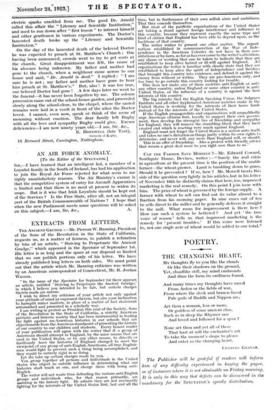EXTRACTS FROM LETTERS.
THE ANCIENT GRUDGE :—Mr. Pierson W. Banning, President of the Sons of the Revolution in the State of California, requests us, as a matter of fairness, to publish a refutation by him of an article, " Striving to Perpetuate the Ancient Grudge," which appeared in the Spectator of September 1st. His letter is so long and the space at our disposal so limited that we can publish portions only of his letter. We have already published long letters on both sides. We must point out that the article which Mr. Banning criticizes was written by an American correspondent of Connecticut, Mr. R. Jordan Wasson.
" In the issue of the Spectator for September 1st there appears an article, entitled ' Striving to Perpetuate the Ancient Grudge,' in which I believe you intended to be fair, but certain charges therein made are untrue.
I wish to direct my criticism of your article not only against your attitude of mind as expressed therein, but also your inclination to hairsplit minor matters, in place of a matter of fact statement untarnished and presented in a scholarly way. I am writing in protest as President this year of the Society, Sons of the Revolution in the State of California, a strictly American patriotic and historic society that has been instrumental in leading the fight against un-American histories in our schools that are objectionable from the American standpoint of presenting the history of our country to our children and students. Every honest reader of your publication will agree with the writer that if a group of Americans should attempt in England, by the same means that arc used in the United States, or by any other means, to directly or insidiously have the histories of England changed to meet the viewpoint of any group of anti-English Americans, all true English- men would fight to prevent such a thing being accomplished, and they would be entirely right in so doing. Let the take up certain charges made by you. You group together all persons and individuals in the United States who object to outside influence in determining what our histories shall teach as one, and charge them with being anti- English. The writer will not waste time defending the various anti-English groups and individuals who, for that reason primarily, are assisting in the history fight. He admits they are not necessarily fighting for the interests of the United States first, last and all the time, but in furtherance of their own selfish aims and ambitions. That they concede themselves. But most of the patriotic organizations of the United States are taking a stand against foreign interference and influence in this country, because they represent exactly the same type and kind of citizen that England has been able to depend upon, as the backbone of that country.
The writer wishes to present one other matter. The organi- zations established in commemoration of the War of Inde- pendence in the American Colonies do not have in their con- stitutions or by-laws, so far as has ever come to the writer's attention, any clause or wording that can be taken to indicate that they are established to keep alive hatred or against England. All organizations the writer is familiar with clearly state that they are established to keep alive the spirit of independence and freedom that brought this country into existence, and defend it against the enemy from without or within. They arc pro-American only, and too busy to go outside this country looking for trouble. This does not make any of these societies anti-English or anti. any other country, unless England or some other country is anti- United States, or the influence of a country is against the best interests of this country. The big mistake that the English Speaking Union, the Sulgrave Institute and all other hyphenated-American societies make in the United States is working for the interests of their home lands instead of for the interests of the United States.
If the English propagandists and organizations will unqualifiedly urge American citizens first, loyally to support their own govern- ment, then develop the strongest tics of friendship and sympathy for England, they will remove the stumbling block that they have created and which is reacting very much against England. England must not forget the United States is a nation unto itself, and takes no one's dictation on things justly within its own rights to determine, and never will, any more than England will, or should. This is an offer of friendship. Also a protest with friendly advice that means a great deal more to you right now than to us."
CAN THE FARMER SAVE HIMSELF ?—Mr. Edward Coward, Southgate House, Devizes, writes :—" Surely the real crisis in agriculture at the present time is the position of the amble farmer—the wheat-grower. Land is tumbling down to grass. Should it be prevented ? If so, how ? Mr. Morrell treats this side of the question very lightly in his articles, but in his letter of November 10th he distinctly claims that herc,too, improved marketing is the real remedy. On this point I join issue with him. The price of wheat is governed by the foreign supply. A farmer with wheat to sell can find out its value almost to a fraction from his morning paper. In nine cases out of ten he sells direct to the miller and he generally delivers it straight to the mill. What room for improvement is there here ? How can such a system be bettered ? And yet the true voice of reason' tells us that improved marketing is the remedy for present troubles.' If this voice were listened to, not one single acre of wheat would be added to our total."


















































 Previous page
Previous page